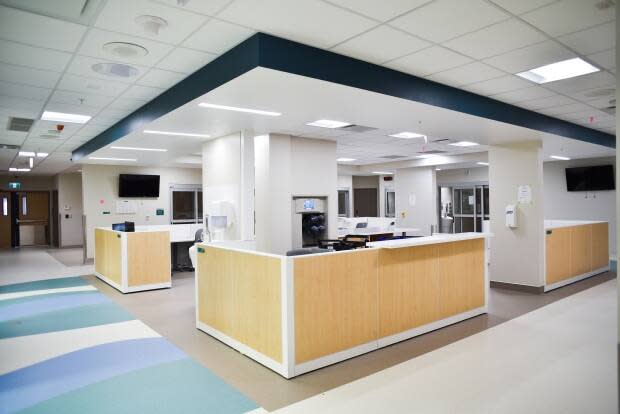Yellowknife's new hospital comes in millions over budget due to property tax flub
The Northwest Territories government will pay millions more than it expected to for the new Stanton Territorial Hospital in Yellowknife.
That's because of a major jump in the hospital's property tax bill.
During a brief, three-day sitting of the Legislative Assembly in December, Finance Minister Caroline Wawzonek asked MLAs to approve a $4.5 million budget increase for the Department of Municipal and Community Affairs, which is responsible for paying municipalities property taxes.
A majority of that money is needed to cover a major increase in the municipal property tax owed after the new, $350 million Stanton Hospital became operational last May.
Property tax for the hospital went from $770,000 in 2016 — before the new hospital was built — to $4.5 million.
It's an increase the Finance Department didn't see coming, Wawzonek said, which has some MLAs scratching their heads.

"I certainly was more than a little surprised," Frame Lake MLA Kevin O'Reilly told CBC.
"The [hospital's] official opening date has been known for probably a year in advance, so it shouldn't have come as a surprise," he said. "It should have been budgeted for, so, I'm just not sure how it slipped through the cracks."
When questioned by MLAs as to why the increase wasn't initially budgeted for, Wawzonek, who took over as minister of Finance in December, didn't have an answer.
"It is unfortunate that they weren't budgeted for internally," she said. "But the best I can do in the situation that I am in ... is to have caught this fact when we did and to do what we could to take the steps that we could here."
"There needs to be a better review … It doesn't eliminate the fact that, unfair, unfortunately, we are at a situation now that the minister of Municipal and Community Affairs, MACA, does not have this money available to it within its budget," Wawzonek told the legislature.
Total cost pushes $900 million

In 2015, while pitching the hospital to the public, officials with the Department of Finance hailed the new hospital as the largest building project ever undertaken by the N.W.T. government. The CBC was told that, over its 34-year lifespan, the hospital would cost roughly $750 million.
But that number didn't include property tax, which is now estimated to add another $140 million, bringing the total cost of the hospital closer to $900 million.
Before the government broke ground on the new hospital in 2015, the city of Yellowknife assessed the old hospital lot and building at about $48 million, meaning the government paid $773,000 for property tax. Now, with the new hospital's lot and building assessed at more than $300 million, the government is paying $4.5 million.
Silver lining
While the jump may be a headache for the Finance Department, there's a silver lining for people who own property in Yellowknife.
Every year during its budget deliberations, Yellowknife city council wrestles with how much it needs to bring in from property taxes to help pay for its operations. Just how much of that revenue each property owner has to pay is based on the mill rate and the assessed value of their property.
It should have been budgeted for, so, I'm just not sure how it slipped through the cracks. - Kevin O'Reilly, MLA for Frame Lake
The territorial government doesn't pay property tax like private property owners do. Instead, municipalities hand the government a property tax bill. The government then gives the municipality what it calls a "grant in lieu of tax" for the exact same amount.
In it's 2020 budget, approved in December, Yellowknife city council decided it needed to collect $31.4 million in property taxes. Now that the territorial government will be paying a multi-million-dollar chunk of that, the portion other property owners have to pay will decrease.
The government will be handing down it's budget for the 2020-2021 fiscal year later this month and Wawzonek said it accounts for the hospital's property tax.
But just where the territorial government plans to get the extra $4.5 million a year is unclear.
"It happened under the last assembly...You have to make sure you're evaluating it accurately, appropriately. Our hope is that with some better tracking mechanisms between departments, that it helps provide some oversight to both," Wawzonek told CBC.
"To me it's about forward looking rather than looking back."


